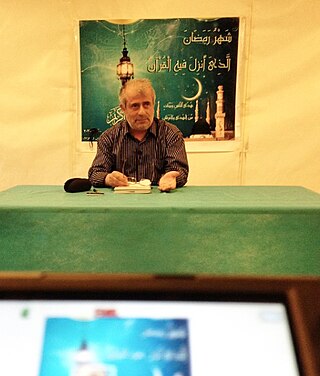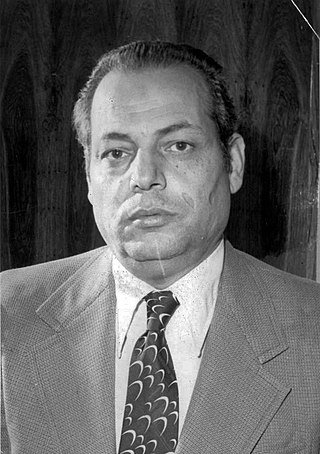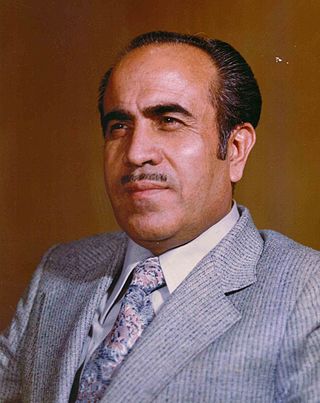
Ali Shariati Mazinani was an Iranian revolutionary and sociologist who focused on the sociology of religion. He is held as one of the most influential Iranian intellectuals of the 20th century, and has been called the "ideologue of the Islamic Revolution", although his ideas did not end up forming the basis of the Islamic Republic.

Liberalism in Iran or Iranian liberalism is a political ideology that traces its beginnings to the 20th century.

Mojahedin of the Islamic Revolution of Iran Organization is a reformist political organization in Iran. It is a small yet influential organization, and participates in political activities similar to a political party. Historian Ervand Abrahamian referred to the group as "a circle of intellectuals and technocrats radical in economic policies but relatively liberal in cultural matters."

Morteza Motahhari was an Iranian Twelver Shia scholar, philosopher, lecturer. Motahhari is considered to have an important influence on the ideologies of the Islamic Republic, among others. He was a co-founder of Hosseiniye Ershad and the Combatant Clergy Association. He was a disciple of Ruhollah Khomeini during the Shah's reign and formed the Council of the Islamic Revolution at Khomeini's request. He was chairman of the council at the time of his assassination.

Hasan Yousefi Eshkevari is an Iranian cleric, researcher, journalist, reformist and former political prisoner. He has been described as "an active supporter of the revolution" who became "an outspoken and influential critic of the current Iranian version of theocracy."

Parliamentary elections were held in Iran on 13 March 1980, with a second round on 9 May. They were the first elections to the Majlis since the overthrow of the Shah, and were contested to a considerable degree on a party basis.

Ali Akbar Moinfar was an Iranian politician and the first oil minister of the Islamic Republic of Iran, serving briefly from 1979 to 1980. He later served as a member of the Parliament of Iran from 1980 to 1984, representing Tehran, Rey and Shemiranat.

Mojahedin of the Islamic Revolution Organization was an umbrella political organization in Iran, founded in 1979 by unification of seven underground Islamist revolutionary paramilitary and civil organizations which previously fought against the Pahlavi monarchy.

The Islamic Association of Teachers of Iran is an Iranian reformist teacher's political organization/labor union. Most members of the association are employees of Ministry of Education.
JAMA is an Iranian political party founded in 1964. The party which was mainly active between 1979 and 1981 and a junior partner in the Cabinet of Bazargan, had been outlawed throughout much of its history due to dissenting the rule of both Pahlavi dynasty and the Islamic Republic.
Forqan Group was an Iranian opposition militant group with clandestine cell system adhering to a Shia anti-clerical Islamist ideology.

Socialism in Iran or Iranian socialism is a political ideology that traces its beginnings to the 20th century and encompasses various political parties in the country. Iran experienced a short Third World Socialism period at the zenith of the Tudeh Party after the abdication of Reza Shah and his replacement by his son, Mohammad Reza Pahlavi. After failing to reach power, this form of third world socialism was replaced by Mosaddegh's populist, non-aligned Iranian nationalism of the National Front party as the main anti-monarchy force in Iran, reaching power (1949–1953), and it remained with that strength even in opposition until the rise of Islamism and the Iranian Revolution. The Tudehs have moved towards basic socialist communism since then.

Mostafa Katiraei was an Iranian engineer and politician who served in the interim government of Bazargan as the minister of housing. He was also a member of the Council of the Islamic Revolution.

Taher Ahmadzadeh Heravi was an Iranian nationalist-religious political activist who held office as the first governor of Khorasan Province after the Iranian Revolution.
People's Revolutionary Organization of the Islamic Republic of Iran was an armed political party in Iran.

Radical Islam: The Iranian Mojahedin is a book by historian Ervand Abrahamian about the late 20th-century political history of Iran, and a thorough case study of the People's Mujahedin of Iran (MEK). The book also includes a short biography of Ali Shariati and a review of his works in order to explore the influence this had on the group's early ideological traits. The book was a duplicate publication by I.B. Tauris and by Yale University Press, being first published by the former in 1989 in the United Kingdom. It is widely regarded as an important academic source on the MEK.
The Religious–Nationalists or the National–Religious are terms referring to a political faction in Iran that consists of individuals and groups embracing Iranian nationalism and Islam, as an integral part of their manifesto. They self-identify as political followers of Mohammad Mosaddegh and their modernist religious outlook makes them advocates of coexistence of Islam and democracy, an idea distinguishable from those of ideologies such as Pan-Islamism or Islamism.
Shariatism is a body of ideas that describes the inspiration, vision, and the life work of Ali Shariati.

Pourandokht "Pouran" Bazargan was an Iranian teacher, revolutionary and translator. She was notably the first female member of the People's Mojahedin Organization of Iran (MEK).

The Artistic Sect of Islamic Revolution, also known as The Artistic Sect of the Islamic Development Organization and with the former title of the Islamic Art and Thought Sect is a public semi-governmental cultural institution which is a subset division of the Islamic Developmental/Advertising Organization that concentrates mostly on artistic activities.














